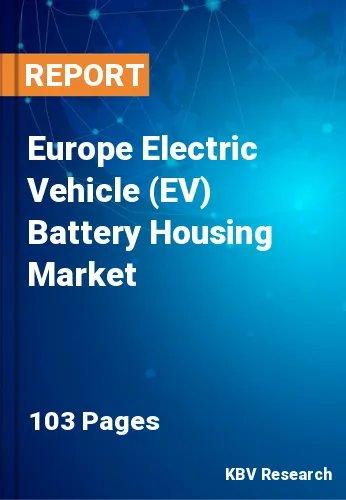The Europe Electric Vehicle (EV) Battery Housing Market would witness market growth of 12.5% CAGR during the forecast period (2023-2030).
Adopting cutting-edge battery housing solutions is driven by increased demand for electric vehicles. Consumers are increasingly pursuing cleaner alternatives to traditional internal combustion engine vehicles due to a heightened consciousness of environmental concerns and an increased focus on mitigating carbon emissions. As lithium-ion batteries evolve to offer higher energy density, faster charging times, and improved overall performance, the design and construction of battery housing must keep pace. Adopting innovative materials and thermal management systems within the housing contributes to the efficiency and longevity of the batteries, aligning with consumer expectations for enhanced driving range and reliability.
Consumer preferences for electric vehicles are shifting as consumer awareness of the environmental impact of regular vehicles develops. The success of EVs is closely tied to the perception of these vehicles as not only environmentally friendly but also technologically advanced and reliable. The safety and efficiency of the battery housing are key considerations for potential buyers, influencing the adoption of electric vehicles. The complex nature of electric vehicle technology has led to increased collaborations and partnerships among automotive manufacturers, battery suppliers, and technology companies.
The expansion of charging networks, including fast-charging stations, promotes the adoption of electric vehicles and, consequently, increases the demand for EV battery housing solutions that align with the evolving charging ecosystem in Germany. The growth of the charging infrastructure supports the adoption of EVs and drives the demand for compatible EV battery housing in France. French automakers, including Renault and Peugeot, have shown a strong commitment to electric vehicle development. The production and promotion of electric vehicle models contribute to the mainstream acceptance of EVs in France, leading to increased demand for EV battery housing components. France has several research and development centers focusing on electric vehicle technologies. Hence, all these factors will uplift the regional market’s expansion in the coming years.
The Germany market dominated the Europe Electric Vehicle (EV) Battery Housing Market by Country in 2022, and would continue to be a dominant market till 2030; thereby, achieving a market value of $1,233.6 Million by 2030. The UK market is exhibiting a CAGR of 11.5% during (2023 - 2030). Additionally, The France market would experience a CAGR of 13.5% during (2023 - 2030).
Free Valuable Insights: The Global Electric Vehicle (EV) Battery Housing Market will Hit $24.3 Billion by 2030, at a CAGR of 13.2%
Based on Vehicle Type, the market is segmented into Passenger Car and Commercial Car. Based on Material, the market is segmented into Aluminium, Steel and Others (Carbon Fibre & Carbon Glass). Based on countries, the market is segmented into Germany, UK, France, Russia, Spain, Italy, and Rest of Europe.
By Vehicle Type
By Material
By Country
Our team of dedicated experts can provide you with attractive expansion opportunities for your business.

